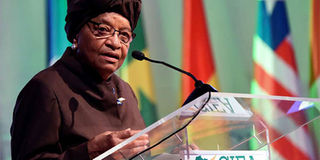Twenty line up in race to succeed Liberia president

Liberian President Ellen Johnson Sirleaf delivers a speech during the opening of the 2017 International Conference on the emergence of Africa in Abidjan on March 28, 2017. Twenty candidates have lined up to succeed President Sirleaf in an election set for October 10, 2017. PHOTO | SIA KAMBOU | AFP
What you need to know:
The looming elections are widely billed as the country’s most hotly contested since the advent of multi-partism in the 1980s.
Considered to be a kind of referendum on President Ellen Johnson Sirleaf’s two terms, the combined legislative and presidential polls will involve more than 1,000 candidates in a country of 4.5 million.
The contenders for public offices will be representing 26 parties, with 20 candidates vying to replace President Sirleaf.
In just two days, two million voters in Liberia, Africa’s oldest democracy, make their choice in the country’s third post-war presidential and legislative races.
The General Election on October 10 will mark the peak of a dramatic season of African polls that has resulted in intriguing changes in the political architecture.
The wave of intriguing polls has seen the ouster of some leaders, the often suspect re-election of veterans, the coming into office of new ones and the welcome retirement of old guards.
Among the highlights of the season was a resurgence of democracy that saw the ouster of tyrants like the Gambia’s Yahya Jammeh, hounded out of office in January.
CEDE POWER
Other rulers have, however, set a new standard for African politics by ceding power to fresh blood, as is about to happen in Liberia.
Among the latest veterans to throw in the towel was Angola’s José Eduardo dos Santos, who after 38 years in power, handed over the reins to his defence minister João Lourenço.
The latter joined a handful of fresh African rulers that includes Somalia’s Mohamed Abdullahi “Farmajo” Mohamed, who assumed office in February.
Some denizens of the continental political scene are staying put, despite ominous developments elsewhere.
OLD HORSES
Among the most tenacious old horses are autocrats like Dénis Sassou-Ngueso of Congo Republic, Uganda’s Yoweri Museveni, Paul Biya of Cameroon and Paul Kagame of Rwanda.
Having been re-elected, however controversially, they are members of an infamous clique of leaders who have shown little willingness to relinquish power.
The Liberian poll will usher in the country’s first presidential transition through democratic means since the end, in 2003, of a 14-year civil war.
The looming elections are widely billed as the country’s most hotly contested since the advent of multi-partism in the 1980s.
CONTENDERS
Considered to be a kind of referendum on President Ellen Johnson Sirleaf’s two terms, the combined legislative and presidential polls will involve more than 1,000 candidates in a country of 4.5 million.
The contenders for public offices will be representing 26 parties, with 20 candidates vying to replace President Sirleaf.
The incumbent, popularly referred to as Madam Sirleaf, was a banker who made history by becoming Africa’s first woman president.
Having assumed office in 2006 at 67, she secured a second six-year term in 2011 after a runoff boycotted by her opponent Winston Tubman.
That notwithstanding, Sirleaf won the Nobel Prize in October 2011 with eminent peace campaigner Leymah Gbowee.
HISTORY OF CHAOS
Poignantly, she assumed the top office following a history of chaos that had seen her predecessors facing cruel fates after rising to power in controversial and often violent circumstances.
Among them was ill-fated Samuel Kanyon Doe, who led a coup against President William Tolbert in March 1980.
The latter, who came from a dynastic family of rulers, was brutally killed alongside most members of the country’s cabinet and traditional political class.
Doe was later to be eliminated in grisly circumstances, to be replaced by the notorious warlord Charles Taylor.
The latter assumed the highest office in the land following a bloody counterinsurgency, but ended up facing a lengthy trial at the International Criminal Court.
FRONTRUNNERS
Eventually found guilty of a raft of offences, including genocide and crimes against humanity, he was handed a 50-year jail term.
The frontrunners for the Tuesday presidential poll are vice-president Joseph Boakai from the governing Unity Party and former world football player of the year George Weah.
The latter, a serving senator, will be running on the Coalition for Democratic Change ticket.
Once the Liberian elections are over, the limelight will revert to Kenya, which is still smarting through a major political crisis pending a presidential poll re-run scheduled for October 26.
Given the current tensions, it remains to be seen if the country will soon get on an even keel and emerge as an exemplary African democracy.





